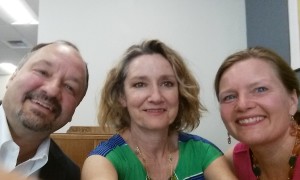Writer says Revisions Reveal the Best Story
The best stories read like they took no effort to write at all. But the more likely reality is that they were labored over, rethought, rewritten and revised during angst-ridden hours by a writer who battled several rounds of self-doubt. Learning the story behind the story can be as inspiring as the story itself.
Laura-Lynne Powell, my creative sister-in-law, successfully placed such a piece in the Sacramento Bee earlier this year about fathers and the anniversary of the civil rights marches that led to the adoption of the Voters Rights Act.
Selma’s 50th provided an opportunity to reflect how far the nation has come since the turbulent 1960s and how far it still has to go. It also provided a chance for families to honor members who were foot soldiers 50 years ago. And it allowed sons and daughters to honor fathers and mothers who weren’t in Selma but were shaped by the events that happened there nonetheless. Read the full piece
It was a hard piece for her to write for many reasons, but thankfully she persevered. Here is her perspective:
What was your motivation?
I envisioned this piece as an ode to history. A story about sons honoring something in history that shaped their fathers. In writing the story, I too was honoring those people both sons and fathers.
What was your challenge?
I wanted this to be a first-person piece because that is how I write everything. A story is more authentic to me if I’m just honest with the reader about the fact that it is me sitting at the keyboard sharing this story. But my family had nothing to do with Selma or the Civil Rights movements of the 1960s, so I found myself feeling somewhat confused about my right to write about. I wasn’t there. I wasn’t the son who honored his father. So, the challenge was how to write from my own perspective while still telling other people’s stories.
How did you overcome it?
I started with the way this story was revealed to me, with my husband telling me that he regretted not going to Selma for the 50th anniversary of the Selma to Montgomery march with his father, who had marched with Martin Luther King there 50 years earlier. At first my husband wasn’t happy with the “regret” angle and I wanted to respect that. As I thought through the story and rewrote it, it became not a regret piece but a story about how my husband actually honored his father when he shared his father’s photo on his own Facebook page. Then it occurred to me that Selma had impacted me as well. My husband is who he is because of his parents and how his parents’ lives were shaped by what happened in Selma.
What is your insight from this piece?
All of these revelations and twists and the procession of my thinking occurred over many, many rewrites. I think I rewrote it at least five times. The final edit by the editor of the Sacramento Bee was minor but pivotal. He pointed out a lack of clarity in the nut graph, and when he said that, I knew exactly what I had to do. I am happy with how it all turned out. It says exactly what I hoped it would.




